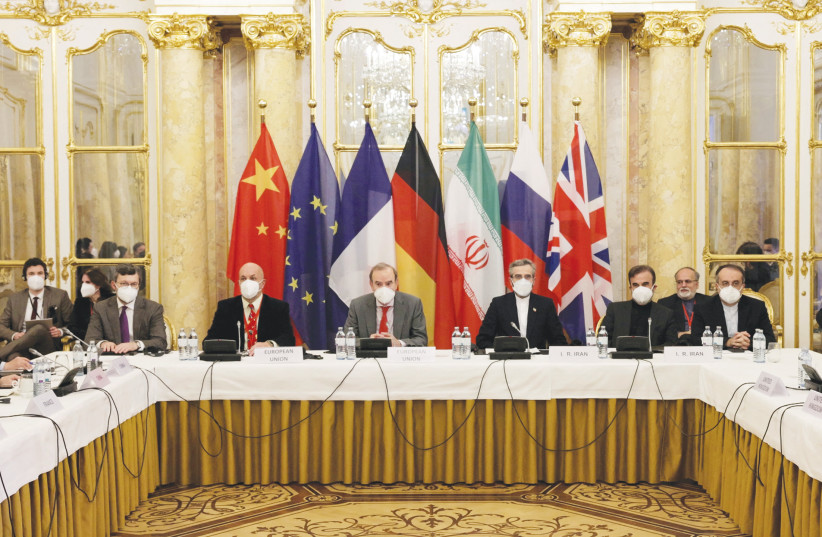Wars, such as the one raging now in Ukraine, create conflicts of interests and values for most states. Israel is no exception. When Foreign Minister Yair Lapid condemned Russia’s invasion of Ukraine, he must have had the value of support for democracy, freedom of a state to decide its destiny and its sovereignty – clearly a noble cause. The fact that earlier he received a call from the US secretary of state reminded Lapid – if that was necessary – that Israel’s only major strategic ally is the US, and it is important to join it and other like-minded states in these situations.
But that is just one side of the balance sheet of interests. Russia has been a major player in the Middle East and, though it lost some of its assets in the region since the 1967 Six Day War and certainly after the collapse of the Soviet Union, it has regained influence in Syria, Libya Turkey and Iran. The relations between the latter and Moscow are of special significance. The major strategic security threat that Israel faces emanates from Iran’s’ ambitions and activities in the region. Specifically, in Lebanon and Syria, Russian military forces and equipment are deployed for the purposes of upholding the Assad regime and maintaining a presence in the East Mediterranean basin.
In this delicate situation, Russia and Israel have found a formula that allows both to pursue their different goals in Syria, with Washington being aware of this vital interest and coordination with Moscow.
The talks in Vienna over the future of the JCPOA 2015 deal between the five permanent members of the UN Security Council plus Germany (P5+1) and Iran are crucial for Israel’s long term security. Russia has significant position and role in them, since Tehran is more likely to listen to the voices of Russia and China than to those of the US, France, Britain and Germany. Moscow has applied friendly persuasion toward Iran, in an attempt to reach a solution to the deadlock. It remains to be seen how the Ukrainian crisis will affect these talks, which Israel has an interest in their success.
Last but not least, the close to 200,000 core Jews living in Russia, continuing communal life. Their alternative potential for immigration to Israel is a key political and demographic consideration.

These are obviously conflicting interests and Israel is required to master all the diplomatic skills to manage the risks that are involved in any decision taken in this matter and its presentation to three major powers involved: Russia, the US and Europe. The case of China and India is interesting, though not only size make their dilemma different from that of Israel. Putin was the major political figure attending the opening ceremony of the Beijing 2022 Winter Olympics. While in China he and China’s President Xi Jinping concluded what can be described has the ideological platform for the Cold War 2.0 with the US.
And Putin waited until the Olympic Games were over to launch his invasion, so as to not steal world attention from China basking in the success of conducting them in the face of the pandemic and diplomatic boycott. Yet, China abstained in the vote on the UN Security Council draft Resolution, which deplored the Russian action under Chapter VII of the UN Charter, which enables the Security Council to impose sanctions if so decided by the council. Whether because China misinterpreted Putin’s earlier moves amassing troops around Ukraine or because it seeks to drive a wedge between Europe and the US by presenting to the latter a responsible, moderate and evenhanded international actor, the fact currently remains that China has left Russia alone to block the resolution.
India, the largest democracy and key ally of the US in the struggle against China in the Indo-Pacific strategic space, also abstained. The conflict with Pakistan over Kashmir is a key factor in India’s security and foreign policy, and preserving Russia’s neutrality on this issue is vital to India - so are the coal, natural gas and S-400 air dense systems that India procures from Russia.
Sometimes, countries find themselves facing conflicting interests and they should pause, reflect and avoid taking what could become morbidly costly decisions. However, Israel decided to vote at the UN General Assembly for the resolution condemning the Russian invasion into Ukraine. This is a toothless resolution but should nonetheless be followed by Israel’s diplomatic activities to ensure that Israel interests are protected.
The writer is a senior researcher at the Institute for National Security Studies, Tel Aviv University and formerly Israel’s ambassador to Jordan and the European Union.
